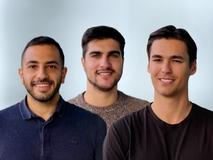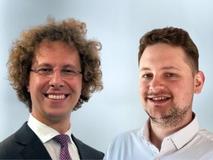Startups developing the next-generation of antibody engineering, AI-based automation for the coating industry, enjoyable prosthetics, automated indoor farming solutions, and an on-demand tutoring platform each win CHF 10,000
28.04.2021
Adaptyv Biosystems, CoatingAI, macu4, PleasantPlants, and TeachRemote win Venture Kick's first stage of financial and entrepreneurial support. Their projects accelerate antibody discovery to develop better therapeutics, leverage the power of artificial intelligence to automate coating processes, introduce a customization software that makes it possible to personalize a passive arm shaft in record time, allow homes and restaurants to produce their own organic food indoors, and enables users to recreate a real learning environment and real writing feeling during an online session.
 |
 Adaptyv Biosystems' founders: Moustafa Houmani, Daniel Nakhaee-Zadeh and Julian Englert
|
 coatingAI: CFO/CMO Malcolm Werchota (left) & CEO/CTO Marlon Boldrini
|
 macu4: from left to right - CEO Myriam Lingg, CTO Lukas Schiller , and Engineer Alec Chevrot
|
 PleasantPlants: from left to right - CEO Jenny Held, CTO Alexander Smirnow & Lead Biologist Lucas Hemmerle
|
 TeachRemote's co-founder, Software & Finance, Fatih Gök
|
Adaptyv Biosystems: enabling the next-generation of antibody engineering
Antibodies have become the fastest growing class of therapeutics in recent years. They have great potential for the treatment of several high-impact diseases such as cancers, as well as autoimmune and metabolics diseases. However, antibody discovery is challenging. Current methods suffer from high screening costs, low throughput, and long discovery timelines. Moreover, companies are using an assortment of fragmented processes. Overall, this makes it difficult to generate large amounts of high-quality data about antibody discovery and to integrate this data to form the knowledge needed for better antibody design.
Adaptyv Biosystems is developing a high-throughput antibody engineering platform using a combination of synthetic biology and microfluidics. The team is composed of founders Moustafa Houmani, Daniel Nakhaee-Zadeh Gutierrez and Julian Englert as well as EPFL professor Sebastian Maerkl as scientific advisor. Moustafa and Daniel are developing the team’s technology platform while Julian is in charge of business development and strategy. With their system, they can rapidly synthesize thousands of antibodies in parallel and analyze them for a multitude of important characteristics. This allows for the generation of high quality data which is then being fed into a computational pipeline. Thus, by combining wet lab experimentation with data analysis, each set of experiments provides real-world feedback that improves the design of the next set of antibodies. Using this iterative process, they can guide and accelerate antibody discovery to develop better therapeutics and create novel designs to tackle untreated diseases.
The Venture Kick funds will help them develop and benchmark their prototype platform. They are planning to work with first customers at the end of 2021. adaptyvbio.com
Antibodies have become the fastest growing class of therapeutics in recent years. They have great potential for the treatment of several high-impact diseases such as cancers, as well as autoimmune and metabolics diseases. However, antibody discovery is challenging. Current methods suffer from high screening costs, low throughput, and long discovery timelines. Moreover, companies are using an assortment of fragmented processes. Overall, this makes it difficult to generate large amounts of high-quality data about antibody discovery and to integrate this data to form the knowledge needed for better antibody design.
Adaptyv Biosystems is developing a high-throughput antibody engineering platform using a combination of synthetic biology and microfluidics. The team is composed of founders Moustafa Houmani, Daniel Nakhaee-Zadeh Gutierrez and Julian Englert as well as EPFL professor Sebastian Maerkl as scientific advisor. Moustafa and Daniel are developing the team’s technology platform while Julian is in charge of business development and strategy. With their system, they can rapidly synthesize thousands of antibodies in parallel and analyze them for a multitude of important characteristics. This allows for the generation of high quality data which is then being fed into a computational pipeline. Thus, by combining wet lab experimentation with data analysis, each set of experiments provides real-world feedback that improves the design of the next set of antibodies. Using this iterative process, they can guide and accelerate antibody discovery to develop better therapeutics and create novel designs to tackle untreated diseases.
The Venture Kick funds will help them develop and benchmark their prototype platform. They are planning to work with first customers at the end of 2021. adaptyvbio.com
CoatingAI: AI-based automation for the coating industry
The coating industry faces various problems affecting process control, quality control, labor intensity, and material waste.
To address these issues, CEO/CTO Marlon Boldrini, MSc in software engineering, MA thesis in machine learning for powder coating applications from the Zurich University of Applied Sciences (ZHAW), and Malcolm Werchota CFO/CMO, MSc in material science, specialized in the metallurgical coating, co-founded coatingAI. Their aim is to leverage the power of artificial intelligence to automate coating processes and boost efficiency as well as quality levels to unprecedented heights. To do so, they use 3D computer vision and machine learning technologies to analyze process parameters in real-time and derive optimizations from them. This solution has been in development over the past 2 years starting with Marlons MA Thesis. The development has passed prove of concept and is currently in the data collection phase to get the algorithm ready for industrial use. While at an early stage the product is already highly sought after by renowned industry players. Worldwide there are 20k automatic powder coating lines in use with the potential to save well over 1 million tons of CO2 a year, just in the material. The use of funds from the Venture kick stage 1 will enable visits to coating line operators and the creation of marketing material. coatingai.com
macu4: designing enjoyable prosthetics
Despite the variety of prosthetic solutions for daily activities that are available on the market, still many people reject to use them. Current arm prosthetic market offerings are expensive, complex in use, heavy, and uncomfortable due to the way they are customized and designed. Providers rarely focus on improving the design and lowering costs. In addition, there are almost no sports solutions for people with forearm deficiency, which means that children, in particular, are disadvantaged to pursue different leisure activities.
macu4's team, composed of CEO Myriam Lingg, CTO Lukas Schiller, Engineer Alec Chevrot, Tech Advisor Alex Antosch; and IT Advisor Susanne Suter are creating new opportunities for people with forearm deficiency with one software, one design, and many possibilities to make prosthetics available. They introduce a customization software that makes it possible to personalize a passive arm shaft in record time by bringing innovation to predominantly manual workflows. They change the way how to design passive arm prostheses and solve unaddressed needs by making them up to 75% cheaper & 50% lighter compared to state of art. macu4 is a new concept for passive functional arm prostheses - it is offered as add on to users and as an alternative to non-users. They employ synergetic business models for different stages of macu4 ranging from B2B for the customization software to B2B2C and B2C for the 3D printed medical devices. The market is estimated at 80k people with forearm deficiency in European countries and 400k globally in high-income countries.
They plan to use the Venture Kick funds to finalize the backend of the software and get ready for the market launch through a B2B distributor in four selected European countries in Q4 2021. In parallel, they work on the product development of the prosthesis design (medical device class I) to complete Design Output in August 2021. macu4.com
Pleasant Plants: automated indoor farming solutions
Today’s agricultural practices rely heavily on pesticides, fertilizers, and long-distance transports. This results in unsustainable ecological and economic pressures. As sustainability issues increasingly enter the public eye, strong demand for organic, local, and seasonal food emerges. The main drivers of this trend are the expected health and ecological benefits. Growing food locally and individually would alleviate many negative aspects of centralized outdoor farming, including transports, packaging, water waste, and pesticide pollution. However, for many people and businesses, growing their own plants is currently impossible due to a lack of time, space, or know-how.
Pleasant Plants founders are Jenny Held (Dr. sc. ETH in Physics) and Alexander Smirnow (PhD candidate in Finance at UZH). Lucas Hemmerle (PhD candidate in Biology at ETH) contributes all necessary knowledge about plant growth. They are currently looking for further team members in electrical and software engineering as well as marketing. Their products will allow homes and restaurants to produce their own organic food indoors. They design automated systems in which the plant environment is controlled constantly, which results in efficient growth and little time investment by the user. Their modular designs enable customers to extend and customize their indoor gardens according to their needs. They plan to incorporate Pleasant Plants GmbH in Zürich. Their team comprises experts from biology, engineering, and computer science. They produce their products in Switzerland and collaborate with home appliance manufacturers to ensure efficient integration into homes. They will sell their products first within Switzerland and then in Europe. Per capita consumption of fresh vegetables per year has risen by 25 kg since 1990 (source: SZG). The vegetable market in 2018 had a revenue of CHF 1.98 bn. in Switzerland, of which 22% were organic vegetables. While conventional vegetables saw recessions in 2017/2018, organic vegetables saw a revenue increase of more than 8% in both years (source: BLW).
The Venture Kick funds will be used to ensure a fast market entry of their first product, APPA the Automated Plant Production Assistant, for which they have secured a number of pre-sales. This includes financing the last product safety certifications, as well as marketing and starting collaborations with distribution partners. They plan to collaborate with international distribution partners and their networks to build their own distribution and servicing/support network. They will also investigate patent opportunities and start the patent process. pleasantplants.com
TeachRemote: on-demand tutoring platform
The existing online learning methods only offer a pure digital learning environment. These methods neglect the benefits of being able to observe, intervene and demonstrate just as it is during real side-by-side tutoring. Currently, there is no online learning method on the market that fully substitutes all those benefits and does not allow the usage of your own physical learning materials such as books, pen and paper. However, TeachRemote's Desk Sharing Method does just that.
The TeachRemote co-founders are Fatih Gök, Software & Finance and Metin Gök, Hardware & Sales. Both co-founders have their background in ETH Zurich. TeachRemote (TR) is an on-demand online tutoring platform. It enables users to recreate the classical tutoring environment by online means, it is an interactive, real time solution. Users will only need a phoneholder and their mobile phone with theTeachRemote app installed. Both users of a tutoring session fix their mobile phones to a phone holder. The phone cameras transmit user-desk-surfaces to each other and enable desk sharing. By that way, each user sees on his display what the other writes on his desk using his own physical learning materials during the online session. The market is estimated by the number of students in universities and secondary schools. In Switzerland, it represents 1’460’000 students, in Europe 84’000'000, and globally 350’000’000. The number of paying customers is estimated to 2’920 in Switzerland, 42'000 in Europe, and 175’000 globally.
In their first milestone within the next 6 months after receiving the Venture Kick funds, they will have finished the App customization, product videos production, flyers, website customization, marketing for early adopters. The key result will be the concept as MVP metingoek.wixsite.com/turicum


